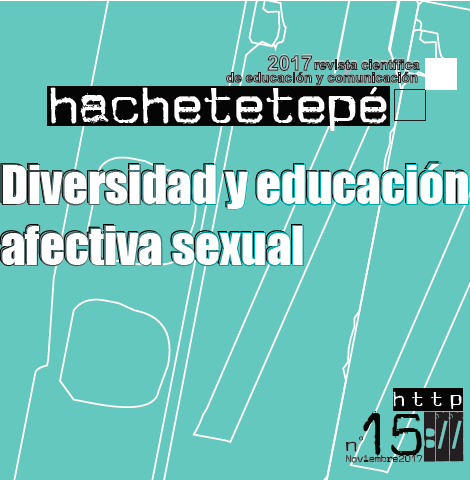LGBTI situation at schools under a Coeduc-Action view
Abstract
Male chauvinist violences are daily present in our lives and we do not realize because we have normalized them. However, said violences are the basis of crimes against women and LGBTI people showed in statistics. Coeducation consists, among other tasks, in deconstructing gender stereotypes which restrict our students’ liberty; in analyzing critically those field permeated by inequalities, such as the configuration of a romantic love model headed toward gender violence; in deconstructing conservative masculinities based on violence and on diversiphobia. Coeducating is creating a better world based on equality, diversity and respect to people.
Keywords
Downloads
How to Cite
License

This work is licensed under a Creative Commons Attribution-NonCommercial-NoDerivatives 4.0 International License.
Those authors who have published with this journal, accept the following terms:
- They will retain their copyright and guarantee the journal the right to first publication of their work, which will simultaneously be subject to the Creative Commons Attribution License . They may be copied, used, disseminated, transmitted and publicly displayed, provided that the authorship, url, and magazine are cited, and are not used for commercial purposes. No derivative works are allowed.
- They may adopt other non-exclusive license agreements for the distribution of the published version of the work (e.g., deposit it in an institutional telematic archive or publish it in a monographic volume) provided that the initial publication in this journal is indicated.
- Disseminate your work through the Internet (e.g., in institutional telematic archives or on your website) once the manuscript is accepted, which may lead to interesting exchanges and increased citations of the published work. (See The effect of open access).
Hachetetepé. Scientific journal of education and communication does not charge a fee for the submission of manuscripts or for the publication of its articles.
References
Baile, J.I. (2007). Un joven homosexual. Bilbao: Editorial Desclée.
Fumero, K, Moreno, M. y Ruiz Repullo, C. (2016). Escuelas libres de violencias machistas. Islas Baleares: Edicions UIB.
Larrauri, M. (2001). La libertad, según Hannah Arendt. Filosofía para profanos. Valencia: Tándem Edicions.
Molinuevo Puras, B. (2008). Las actitudes de los adolescentes y jóvenes ante la diversidad sexual. En Adolescentes y jóvenes lesbianas, gays, transexuales y bisexuales: dificultades y rechazos en su desa-rrollo personal, en sus relaciones y en su socialización. Colección Derechos Humanos “Francisco de Vitoria”. Bilbao: Ararteko. Disponible en http://www.ararteko.net/RecursosWeb/DOCUMENTOS/1/0_1819_1.pdf
Nolla, E. (2008). El punto de vista de las madres y padres sobre la problemática de los adolescentes y jóvenes gays, lesbianas, transexuales y bisexuales. En Adolescentes y jóvenes lesbianas, gays, transe-xuales y bisexuales: dificultades y rechazos en su desarrollo personal, en sus relaciones y en su so-cialización. Colección Derechos
Humanos “Francisco de Vitoria”. Bilbao: Ararteko. Disponible en http://www.ararteko.net/RecursosWeb/DOCUMENTOS/1/0_1819_1.pdf. Fecha de consulta: el 14 de junio de 2017.
Pichardo, J.I. (Coord.). Actitudes ante la diversidad sexual de la población adolescente de Coslada (Madrid) y San
Bartolomé de Tirajana (Gran Canaria), 2007. Realizada por la FELGTB por encar-go del Ayuntamiento de Coslada. Disponible en www.felgtb.org. Disponible en: http://www.felgtb.org/rs/467/d112d6ad-54ec-438b-9358-4483f9e98868/c11/filename/adolescentes-ante-la-diversidad-sexual2.pdf. Fecha de consulta: 14 de junio de 2017.
Platero, R. (2012): Intersecciones. Cuerpos y Sexualidades en la Encrucijada. Barcelona: Bellaterra.






